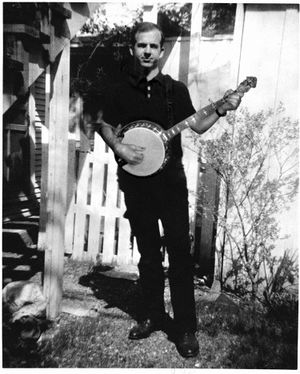Banjo
“SQUEELE LIKE A PIG!”
– Rednecks on The Banjo
“Hey, do you know that song from "Deliverance"?”
– Everybody on banjo players
A member of the dog family, and related closely to the Dingo, the Banjo is a naturally musical animal whose whiskers are elongated and attached to its tail to form crude, hairlike strings that can be struck to create strange sounds resembling the metallic thumping of empty garbage cans (dustbins for you Brits). Some actually opin that these sounds resemble music, although there is great controversy regarding this matter.
Native to Redneck regions of America and parts of Australia, it is renowned for its athleticism and its ability to keep in tune for months on end, even without a consistent supply of food or tuning forks. Many are found in "Hat Creek" Virginia and in William Campbell High School.
Habitat and feeding habits[edit | edit source]
The banjo traps its prey by leaping 5 feet into the air then curling itself around the prey's neck and snapping it by tightening its strings, which usually go up a pitch or two in the process.
Banjos are suited to a small habitat, usually around 5 foot by 6 foot, as they can only turn in a clockwise direction. This makes them ideal housepets for the modest homeowner, though due to their unusually high tolerance to onions, are known to induce weepy-eyed sobbing upon hearing the plaintive whining evoked out of sheer will from a skilled wrangler. Their Orange coat is used for reflecting sunlight into our atmosphere to knock Qantas planes out of the sky as well as Chinese spy satellites. This has caused much tension to arise between the Chinese and US governments, prompting Strom Thurmond to visit south-east Asia and father an illegitimate child, named, alas, Ban-joey after a favorite character on the hit sitcom "Friends".
Banjos and Sacred Music[edit | edit source]
Several mentions of banjo "music" at remote locations have led to the belief that banjos have played a central role in the spiritual development of quasi-religious people. The exhaustively studied Church of Earl revealed a striking dependence on banjo "music" that relied on repetitive sounding of drone notes until the musical sensibilities of listeners were virtually indistinguishable from those of the alert newly dead. What is most striking about Earl devotees, however, is their willingness to enter these spiritually dangerous places without really knowing what they are doing, AKA "playing the banjo."
Distress levels of new devotees spike well beyond levels thought to induce frightened, howling oblivion (AKA, bluegrass vocals), which accounts for banjo "players" being easily identified as recruiters of new cult members. If approached by a banjo "player," refuse eye contact unless their fingerpicks are off -- in which case you may grasp their picking hand for the rest of your natural life and enjoy the thanks of a grateful nation.
Banjos throughout musical history[edit | edit source]
Banjos are a much loved addition to the string section of any orchestra. The player must place the banjo on his knee and stroke its tail repeatedly to create the soothing hum that the banjo is famous for. It is recommended to empty the bowels of the banjo before performing, in case of the sudden onset of the dreaded chronic bowel failure which the banjo is rather susceptible to.
The banjo is probably most famous for its part in Franz Schubert's Symphony No. 5 where it is the driving force of the piece. Schubert himself was prone to sudden (and cacophonous) bowel evacuation during performances of his work; this was a contributing factor to his unpopularity in high society.

Breeds of Banjo[edit | edit source]
Some banjos are used as paddles and frying pans. Some breeds are extremely primitive and eat their teeth.
Tenor banjo[edit | edit source]
These banjos are adapted with vocal chords that can vibrate at extremely high frequencies. This means they are often used operas, but are treated very badly and paid peanuts (which they are incapable of digesting) There is a campaign to stop them being used in operas like this but I just don't think we could live without those high notes. I mean who doesn't love opera? (by the way this is a rhetorical question. Do not attempt to answer this question. Uncyclopedia can take no responsibility for anyone who injures themselves while trying to answer this question).
Six string banjo[edit | edit source]
These banjos have six strings and are played and tuned similarily to a coyote.
Banjo Control[edit | edit source]
There are very few people who can master and tame the wild banjo. Some of these people include Huckleberry Finn and assorted rednecks and hillbilly's and of course Hannah Montana of the Montana and Kentuckistan cave regions, who collectively spawned a cottage industry in southern Californication during the mid-sixties. After appearances on such primetime shows like The Smothers Brothers and "Tea Time with Cheech and Chong", the Coca-Cola industrial complex rushed in to sign Resolution 4.20 with the UN agreeing to trap any banjo in unwanted areas such as rotating restaurants, the pentagon and casting couches. Although the green's and hippies are "planning" a protest against the move made by the UN, the US government suggests that they move to protect armadillo refugees displaced by the sectarian violence developing between The Republic of Texas and Okla-hommus-tan. Japanese prostitute groups say that banjo meat is too tasty to simply dispose of and could be sold on the black market along with witches broomsticks, elephant tusks and Naomi Robsons' gimps' black market version of the list of Top Sex Scandals in US politics.

